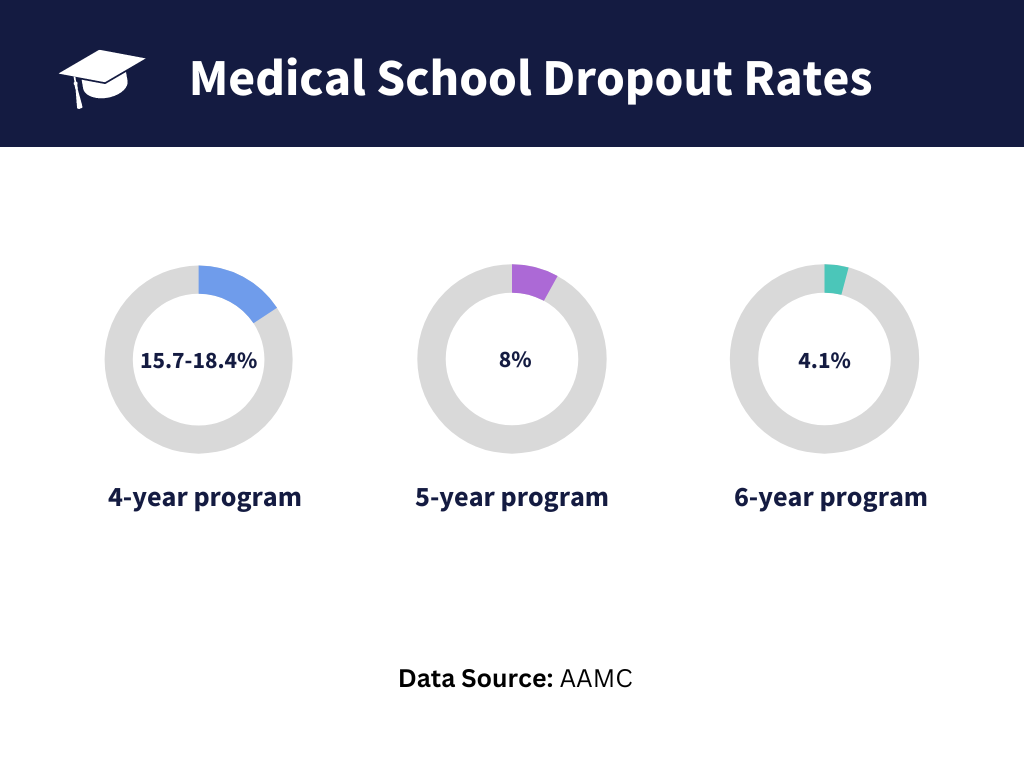Medical school’s stringent admission requirements, rigorous coursework, and long hours are only the tip of the iceberg for doctors. If you’re considering dropping out of medical school, it’s important to think carefully about your decision.
You’ve likely invested a great deal of time and money in your career, so you’ll want to dig deep into your values, your motivations, and what you want from your life moving forward with or without a career in medicine.
In this article, we’ll analyze the reasons and statistics around students who drop out of medical school and provide advice to help you make the decision that’s right for you.
What is the Medical School Dropout Rate?
Dr. Deborah Clark, MD is an internal medicine hospitalist in Carmel, IN. She graduated from medical school in 2006 and has been attending physician since August 2009. She had several peers drop out of medical school during her time there.
“One went on to dental school, one became a realtor, one became a stay-at-home mom,” she says. She continued,
I’d guess most of us thought about leaving before we started clinical rotations, but because it’s so hard to get in, most stick around.Dr. Deborah Clark, MD
Before you decide to drop out of medical school, make sure you’re thinking clearly and not holding yourself to an unfair standard.
According to the Association of American Medical Colleges, the attrition rate for medical students in four-year programs falls between 15.7% and 18.4%. This drops to 4.1% for students who enroll in five and six-year programs.
This research begs the question, why do so many people drop out of four-year medical schools?

What are the Reasons People Drop Out of Medical School?
There are a multitude of reasons students drop out of medical school. Examining the reasons you want to drop out of medical school can help you make the necessary adjustments in your life to either stay the course or find a more fulfilling career path.
1. Mental Health
In a 2019 study, Dr. Martin Hofmeister found that as many as 35.6% of medical students in 13 countries had struggled with suicidal ideation that year.
Students with a prior history of depression, depressive symptoms, psychiatric diagnoses, lack of familial support, financial hardship, lower socioeconomic status, and substance abuse were more likely to struggle with suicidal ideations and mental illness.
Anyone will tell you med school is challenging and it’s a massive commitment that can take a lot out of anyone. There’s no shame in admitting its difficulty.
Tip 1:
If you’re struggling, check in on your mental health. Once a week, take a few minutes to ask yourself the following ten questions. You can even schedule a meet-up with your friends or discuss any of these items with a peer:
- How am I feeling? What sensations and emotions can I name?
- What am I focused on right now? Am I dwelling on anything?
- When did I last eat? Am I drinking enough water?
- How am I sleeping?
- Have I exercised recently?
- What was the highlight of my day today?
- Can I treat myself to something special today?
- Do I have anything to look forward to right now?
- What’s one way I can engage with my friends, family, or community this week?
- What am I most grateful for right now?
Tip 2:
Keep the pressure low and try not to spend too much time on any one question. Aim to cultivate a judgment-free zone. Consider this exercise an inventory that can encourage you to engage in healthy self-care practices.
Tip 3:
If you’re still struggling, remember you don’t have to go through it alone. You can access your university’s mental health resources or look into low-cost therapy options, such as Open Path Collective to work with a qualified professional on your unique issues.
2. Burnout
If you’re considering dropping out of medical school, your program may be too fast-paced for your current needs.
You may end up with a specialty that leads to literally holding someone’s heart in your hand, restoring someone’s sight, or helping someone manage a mental illness. You’ll likely be close to 40 years old by the time you’re a fully trained doctor, at which time you’ll have dedicated more than half your life to research, training, and helping others.
Burnout can manifest as mental and physical symptoms. If you experience any of the following, you may be struggling with burnout:
- Absenteeism
- Anxiety
- Body aches
- Detachment or dissociation
- Emotional numbness
- Exhaustion
- Fatigue
- Frustration and anger issues
- Gastrointestinal upset
- Headaches
- Hypertension
- Job hopping or job loss
- Lack of creativity
- Lack of focus
- Loss of interest in hobbies
- Low commitment to the role
- Low mood and negative attitudes
- More frequent illness or difficulty recovering from illness
- Muscle tension or soreness
- Neglecting responsibilities
- Reduced job performance and productivity
- Sleep issues
Tip 4:
Mental health and burnout go hand in hand. Natural caregivers, especially those in the medical field, sometimes need to be reminded of the importance of taking care of themselves.
To be the best doctor you can be, you need to take time for yourself. If you’re unable to do this with your current schedule, we recommend considering a leave of absence.
You can meet with your Advisory Dean or other mental health resources to discuss your options for short-term breaks.
3. Lack of Free Time and Change in Priorities
Are you the same person you were ten years ago? Because earning a medical degree is such a long-term commitment, sometimes people go through significant personal changes before they complete their programs.
Young medical school students may be attracted to prestigious and high-paying specialties early on in their careers only to find out they don’t like them by the time they’re training.
Other times medical school students meet partners, build families, or face other shifts in priorities that make them question the amount of time they have to commit to their medical education.
Tip 5:
If you’re struggling with the amount of time you’re committing to the medical profession and seeing other important areas of your life suffer, we recommend connecting with peers in similar situations.
There are plenty of medical professionals who manage to care for ailing loved ones, rear children, and be active members of their communities.
By discussing your issues with people who relate, you can identify coping mechanisms, create a village to raise your children around, share hobbies, and build relationships that provide validation and visibility for your hard work and efforts.
4. Staggering Student Loan Debt
According to the Education Data Initiative, the average medical student leaves school with more than $215,100 in debt before factoring in credit cards and other educational debts. That’s a lot of money!
And this debt has continued to increase year over year as tuition and cost of living rise across the country. If you’re feeling low or considering dropping out of medical school, you’ve probably considered the amount of money you’ve had to pay to work as hard as you do.
Whether you’re a first-year, second-year, or third-year medical student with pre-medical school debt or not, you’ve probably struggled to make ends meet unless you come from significant financial means or have outside support.
You may have a lot of anxiety about how you’ll be able to pay back your student loans if you don’t match with residency or if you work in a lower-paying specialty.
Tip 6:
Research medical school debt forgiveness programs. If you choose to complete your education, there are a variety of national, government, and armed forces forgiveness programs available to medical doctors who meet the necessary requirements.
For example, The National Service Corps (NHSC) offers up to $50,000 toward loan repayment for licensed healthcare providers in exchange for two years of service at an approved site.
The NHSC will also provide scholarships to aspiring physicians pursuing a career in primary care. If you choose to leave your program, you still have options to customize your student debt forgiveness. Contacting your lender will allow you to proactively negotiate or refinance.
5. Poor Skills Match
To get into medical school, you have to have excellent grades in the right subjects of a pre-med curriculum. Particularly competitive schools will even look at your volunteer background and high school achievements.
On top of grades, you also have to have excellent standardized test scores, especially on the MCAT, demonstrating your aptitude for the medical profession.
Despite this process, some people get into medical school only to find they don’t have the academic capacity to thrive in the field.
Tip 7:
Try not to shame yourself if you find that you’re a poor skills match for the medical profession.
Sometimes people are forced into the medical field by outside pressures and it can take getting into the field to find out you’re not the right fit.
You’ve devoted a lot of time to getting this far and should be proud of your efforts if you haven’t achieved the intended outcome. Your skills are transferable and a career coach can help you find the right fit if you’re uncertain about your next steps.
What to Do After Dropping Out Of Medical School
Your hard work isn’t sunk costs if you decide to pivot out of the medical field. Good grades and high test scores mean you have a certain level of dedication, knowledge, and focus that you can apply to other fields.
Let’s say you get halfway through medical school and realize it isn’t for you. Is it wrong to quit? Not even a little. Plenty of successful people, including Charles Darwin, Carl Icahn, and Gertrude Stein, are famous medical school dropouts.
It’s far better to have to reconcile one or two years’ worth of loans and move on than it is to deal with two more years of loans plus four years of deferment because you can’t afford to pay down the loans while you’re a resident, along with all of the interest that accrues over that time as well.
Don’t make the decision to quit lightly, but know that walking away is a decision that you can make, with confidence and without guilt.
If you do quit, don’t worry that your career choices are limited. Having an MD degree is incredibly valuable in the job force. You will be quite marketable in a number of fields if you focus on your strengths, use your skills, and do what you love.
Med School Dropouts Have Options
Despite medicine long being a coveted and respected career field, we are experiencing a doctor shortage. The shortage is believed to be due to several factors:
- STEM: Jobs in STEM fields are on the rise, grabbing the attention of young people moving up through school and looking for a rewarding career path for their science and math interests.
- Time: People are seeking a viable work-life balance, and the long hours and high debt required to go into medicine are a deterrent
- Location: A residency means you go where you match, and that puts you largely at the mercy of a system much bigger than yourself. You could end up anywhere, including geographic locations that are not your preference. For many, that is not only not appealing, but it’s also a reason not to go into medicine at all.
- Insurance: More and more people are reading and learning about how frustrating it is to be at the mercy of insurance companies even as a doctor, and are making the decision to pursue other careers that involve more autonomy and creative thinking
Jobs for Medical School Dropouts
There are several jobs and career paths that medical school dropouts are well suited for:
- Physician Assistant: Not to be mistaken for a physician’s assistant, this role is a terrific profession, involving patient care, creative decision-making, science, a reasonable work-life balance, and respectability, all without the burden of medical school and its attendant burden.
- Other health professions: Even though the prospect of starting another professional degree program likely doesn’t sound appealing, give it a minute to sink in. Give chiropractic, podiatry, or ophthalmology some good consideration to see if working in a more specialized, focused healthcare area is the better fit for you.
- Massage therapist: Therapeutic massage is an impactful way to help restore health and well-being to people who really need it.
- Naturopath: Consider looking into healing from a more holistic perspective. A naturopath looks at the whole body to determine the underlying causes of illness, incorporating elements of traditional medicine with more natural therapies as well.
- Mental health professions: Similar to other health professions, perhaps the right fit for you is to counsel others on their mental health and well-being. There are many rewarding avenues that a career in counseling or social work could take you.
- Medical writer: If you have writing skills, you might consider working in medical writing. There is a growing demand for professionals with scientific knowledge who can write a variety of types of documents needed in medical settings.
- Higher education: Consider switching gears and becoming a different kind of doctor. Earning a Ph.D. in nursing, epidemiology, or another scientific field could be the perfect fit for you.
- Public health: A master’s degree in public health could lead to a rewarding career in healthcare administration, project management, or as a safety engineer.
- Public service: Don’t rule out the Peace Corps, nonprofit organizations, or other public service roles. There are many ways to serve others with a health science background.
- Business school: Go the MBA route and combine your science knowledge with a love of business to work in the for-profit sector or at a health-oriented nonprofit.
Planning for Your Next Steps After Dropping Out of Medical School
If you do decide to walk away, your number one goal should be to take care of yourself. Look into ways to seek appropriate, professional advice on your next steps, and make a plan for what’s next.
Here are a few tips on how to get started:
- Find a coach: Your first step in moving forward is to seek out coaching. Life and career coaches are great resources to help you apply your skills to a new path. Either type of professional can help you find your strengths and your new path.
- Network: Don’t just go away quietly. Talk to people in your field, go to conferences and workshops, and tell the people in your life what’s going on. You never know who might be able to help set up an informational interview to help you determine your best next steps.
- Practice self-care: Changing careers is tough, even when you know it’s the right thing to do. Be sure to meditate, do yoga, write in a journal, or do any activity that helps you feel centered and calm.




